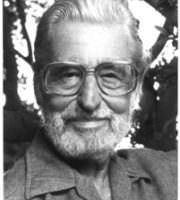by Hervey Allen
AB ALLAD OF N OGENT L ' A RTAUD .
At Nogent, on the river Marne,
I passed a burning house and barn.
I went into the public square
Where pigeons fluttered in the air
And empty windows gaped a-stare.
There crouched a blindman by the wall
A-shivering in a ragged shawl,
Who gave a hopeless parrot screech
And felt the wall with halting reach.
He went around as in a trap.
He had a stick to feel and rap.
A-rap-a-tap, a-rap-a-tap.
I strode across the public square.
I stopped and spoke him full and fair.
I asked him what he searched for there
There came a look upon his face
That made me want to leave the place.
He could not answer for a space.
He moved his trembling hands about
And in-and-out, and in-and-out.
"Kind sir," he said, "I scarcely know—
A week ago there fell a blow—
I think it was a week ago.
I sent my little girl to school,
With kisses and her book and rule,
A week ago she went to school."
The pigeons all began to coo,
"A-cock-a-loo, a-cock-a-loo."
"O God! to be a blinded fool;
I cannot find the children's school—
The gate, the court about the pool—
But, sir, if you will guide my feet
Across the square and down the street,
I think I know then where it lies.
O Jesu! Give me back my eyes!
O Jesu! Give me back my eyes!"
I led him down the littered street,
He seemed to know it with his feet,
For suddenly he turned aside
And entered through a gateway wide.
It was the court about the pool.
Long shadows slept there deep and cool.
No sound was there of beast or bird;
It was the silence that we heard.
"And this," he said, "might be the place,"
An eager look came on his face.
He raised his voice and gave a call;
An echo mewed along the wall,
And then it rose, and then it fell,
Like children talking down a well
"Go in," he said, "see what you see,
And then come back again for me."
Like one who bears a weight of sin
And walks with fear, I entered in—
A turn—and halfway up the stair
There was a sight to raise your hair;
A dusty litter, books and toys,
Three bundles that were little boys,
White faces like an ivory gem;
A statue stood and looked at them.
So thick the silence where I stood,
I thought I wore a woolen hood;
The blood went whispering through my ears,
Like secrets that one overhears.
I looked upon the dead a while;
I saw the glimmering statue smile.
The children slept so sweetly there,
I scarce believed the tainted air.
And then I heard the blindman's stick,
As rhythmic as a watch's tick,
A step—a click, a step—a click—
As slow as days grow to a year,
So long it seemed while he drew near,
But sure and blind as death or fate,
He came and said, "I dared not wait.
It was too silent at the gate."
"And tell me now, sir, what you see
That keeps you here so silently."
"Three harmless things," I said, "I fear,
Three things I see but cannot hear,
Three shadows of what was before,
Cast by no light are on the floor."
"Sir," said the blindman, "lead me round,
Lest I should tread on holy ground."
Like men they lead at dawn to doom,
We slowly climbed the stairway's gloom
And came into a sunlit room.
The ceiling lay upon the floor,
And slates, and books, and something more—
The master with a glassy stare,
Sat gory in his shivered chair
And gazed upon his pupils there.
The blindman grasped me eagerly.
"And tell me now, sir, what you see?
This is the place where she should be—
My Eleanor, who used to wear
Short socks that left her brown legs bare.
She had a crown of golden hair."
I saw his blind eyes peer and stare.
Now there and here, now here and there.
"Blindman," I cried, "these things I see:
Time here has turned eternity.
The clock hands point but only mock,
For it is always three o'clock:
I see the shadows on the wall;
I see the crumbling plaster fall."
"Oh! sir," he said, "I crave your eyes—
Be not so kindly with your lies."
I drew the blindman to my side;
I told the truth I wished to hide.
I said, "I see your Eleanor
And she is dead upon the floor.
And something fumbles with her hair;
I guess the wind is playing there.
And I see gray rats sleek and stout
That dart about and dart about."
"Now, sir," he said, "I love your lies
And Christ be thanked that took my eyes!
But lead me, lead me to my dead!
And let me touch her once," he said
I placed his hand upon her head.
And when we left the charnel place,
I dared not look upon his face;
For suddenly upon the street
Arose the sound of trampling feet,
And wheels that rumbled on the ground,
And ground around and ground around,
The din of them that go to slay,
The shout of men and horses' neigh,
And men and beasts swept on to war
A dreadful drumming on before.
It throbbed and throbbed through Nogent Town,
Till desolation settled down.
The blindman leaned against the door;
"And tell me, sir, about the war,
What is it they are fighting for?"
"Blindman," I cried, "Can you not see?
It is to set the whole world free!
It is for sweet democracy—"
"I do not know her, sir," he said.
"My little Eleanor is dead."





